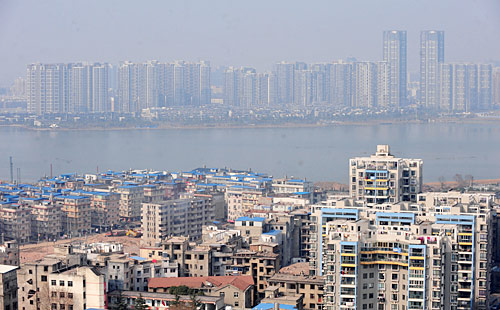|
 |
|
PROPERTY COOLS: Property prices and sales volume dropped in Wuhan, capital of Hubei Province in February with the former dipping 0.66 percent and the latter down 56 percent. It was the first drop in 12 months (HAO TONGQIAN) |
Numbers of the Week
44.1%
China's Purchasing Managers Index, an index of economic activities for the non-manufacturing sector dropped to 44.1 percent from 56.4 percent in January, said the China Federation of Logistics and Purchasing.
16.01billion yuan
China's lottery sales in January rose 26.1 percent year on year to reach 16.01 billion yuan ($2.44 billion), said the Ministry of Finance.
TO THE POINT: The feverish auto market is calming down, with February sales dropping 33.1 percent from a month ago. Chinese thermal power generators are facing some serious headwinds as coal prices increase. Ernst & Young's report shows China races ahead of other countries in renewable energy investments. The U.S. coupon website Groupon.com extends its reach into China, but its prospects remain uncertain. Digital advertiser Focus Media is faring well thanks to a booming advertising market in China.
By HU YUE
Trade Deficit
The fast growth of imports and the slower pace of export growth resulted in a trade deficit in February this year, the first monthly deficit since March 2010. China recorded a trade deficit of $7.3 billion in February, said the General Administration of Customs (GAC) on March 10.
In the first two months this year, China posted a trade deficit of $890 million, as January's trade surplus halved year on year to $6.45 billion.
The GAC attributed the deficit to the week-long Spring Festival break (February 2-8), saying the holiday had led to a decrease in exports.
China's foreign trade rose by 10.6 percent year on year to $200.78 billion in February, with exports growing by 2.4 percent year on year to $96.74 billion while imports surged by 19.4 percent to $104.04 billion.
The EU remained China's largest trade partner during this period, followed by the United States and Japan.
China is expected to register trade deficits in several months this year as the growth of imports would likely outpace that of exports.
Cooling Auto Market
For China's auto market, the euphoria of high sales seems to be fading.
Auto sales across the nation totaled 1.267 million units in February, up 4.57 percent year on year, said the China Association of Automobile Manufacturers (CAAM). But the figure represented a 33.1-percent drop from January. The February output also fell 29.9 percent month on month to 1.26 million units.
CAAM attributed the downturn to the impact of the Lunar New Year holiday (February 2-8), end of policy incentives and new limits on car purchases in Beijing.
The government this year rolled back some supportive policies, including a favorable purchase tax for smaller cars, subsidies to rural buyers and an old car replacement program.
"I'm not surprised at the February data. But there's no need to be overly pessimistic about prospect of the market," said Xiong Chuanlin, Deputy Secretary General of CAAM.
After two years of vibrant growth, the market is more likely to plateau, said Xiong.
In addition, auto exports reached 43,400 units in February, down 16.51 percent from January, said the CAAM. But it still represented a 63.56 percent growth year on year.
Power in the Red
China's thermal power generators are swimming in red ink as coal prices soar.
The "big five" generators—Huaneng, Datang, Huadian, Guodian and China Power—incurred combined loss of 13.7 billion yuan ($2.1 billion) in 2010, said Zhai Ruoyu, former general manager of Datang.
This was their third loss-making year in a row, and the root cause has been pinned on skyrocketing coal prices, which account for 70 percent of their costs, he said.
The steam coal price at Qinhuangdao Port, an industry benchmark in the country, climbed around 7 percent last October, as a nationwide winter freeze pushed up demand.
| 